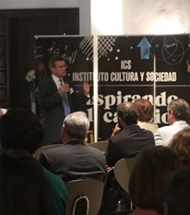2013_09_20_ICS_La pobreza extrema no se erradica sólo con buenas intenciones: se necesita investigación para hallar soluciones eficaces
"Extreme poverty is not eradicated only with good intentions: research is needed to find effective solutions"
About 80 people attended the presentation in Seville of the Institute for Culture and Society (ICS) ,University of Navarra, where the Andalusian Professor Luis Ravina presented his project on ‘Poverty and Development'

‘Extreme poverty is not eradicated only with good intentions: research is needed to find effective solutions' said Luis Ravina- Andalusian Professor of Economics- who spoke at the presentation of the Institute for Culture and Society (ICS), University of Navarra, in Seville. About 80 people attended the event.
Professor Ravina referred to a study about Kenya, as an example, seeking to increase the number of schools to raise the enrollment rate of children. ‘To achieve that children attend more frequently school, the priority was not to provide funds to build them, but to fight against diarrhea, as these serious stomach problems were a major reason for absenteeism.' as demonstrated.
South Africa, Kenya and the Philippines
The professor and principal investigator on the project made a presentation of main research areas of ‘Navarra Center for International Development'. As he explained, the research group is focused on three issues fostering the development of peoples: migration, the transfer of technology (innovation) and the quality of institutions (corruption).
‘Up to now, we have focused on South Africa, Kenia, and Philippines, where there are cases of real necessity. We will shortly go to Central America, since poverty is closely related with violence and drug, and we want to help fight against both through science' said.
The director of ICS also spoke at the presentation. He talked about the keys of the institute, where about half hundred of specialists from 17 countries conduct their research. He explained the eight lines of investigation carried out in the Institute, included in four research areas: ‘Contemporary Art'; ‘Family, Education and Society'; ‘Globalization, Human Rights and Interculturalism'; ‘Poverty and Development'.
